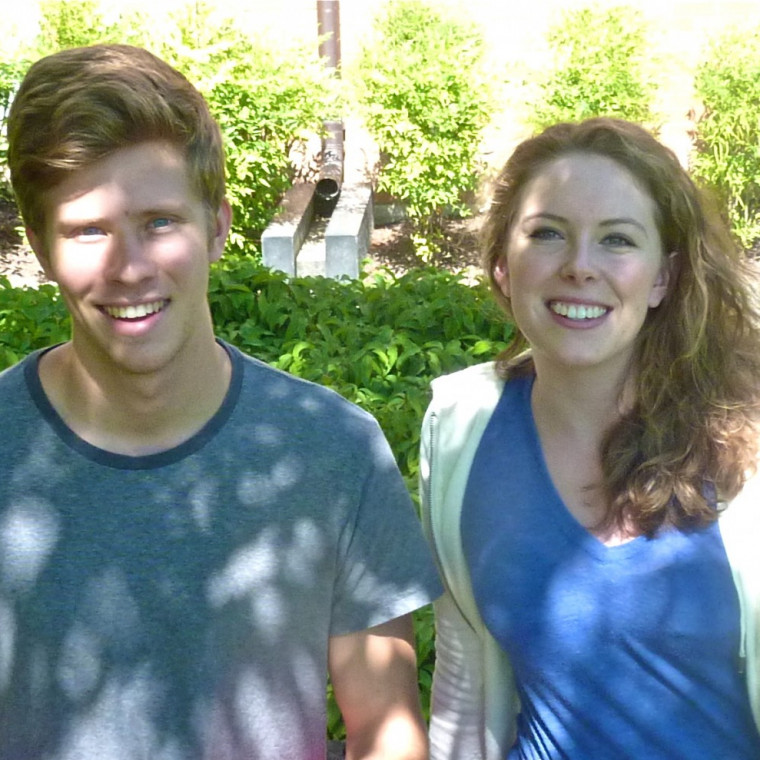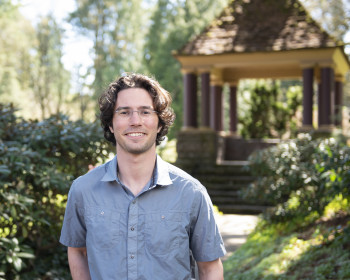Students investigate human trafficking
Open gallery

During the summer, Lewis & Clark students continue to work hard in their fields of study. By collaborating with faculty on research projects, students are able to engage their curiosity, expand their learning, and prepare for life after college, all while making meaningful contributions to scholarship.
Rachel Schumacher ’14 and Nathan Romine ’14 are working alongside Assistant Professor of International Affairs Heather Smith-Cannoy on her upcoming publication on human trafficking. The group studies trafficking both in Oregon and around the world. In the following Q&A, the team members reflect on their experience.
What are you researching? What question or problem are you trying to answer/solve with your research?
Using cases from both the developing and developed world, the book we are working on explores the similarities and differences in traffickers’ methods and patterns of victimization, while investigating the dramatically different ways that local and state authorities are combatting human sex trafficking. We identify the variations between the developed and the developing world in supply, demand, and responsive approach to the problem. We support our findings using case studies, existing data, government and nongovernmental organization reports, as well as an original data set. We have case studies on trafficking in the the U.S., France, Italy, India, Thailand, Moldova, and Russia.
Does your research have any potential applications in the real world, or will it influence other work in your field?
We are very excited about the outcome of this project because we feel as though it has the potential to make a difference in the real world. As we get deeper into the research this summer, we are finding that certain approaches to combating trafficking and assisting trafficking victims have yielded far better results. For example, in Italy the Department of Equal Opportunities is solely responsible for directly anti-trafficking policy. This centralized approach has led to very progressive, victim-centric policies that go far beyond what other countries are currently doing to assist trafficking victims. We hope these types of insights will contribute to better anti-trafficking policies and more help for victims.
Is any of your research taking place off campus? If so, what’s that experience like?
Romine: Most of the research has taken place in my second home, Watzek Library. However, we do conduct some interviews via Skype so as to confirm and discover new trends in human trafficking as well as the tactics used to combat it.
What first sparked your interest in this research area?
Romine: I’ve always had an interest in movement and the displaced, whether it be refugees, immigrants, or victims of human trafficking, as in the case of our research. When I took Heather’s Human Rights class in the fall, I initially wanted to study the ways in which Mexico’s drug war had increased human trafficking and the ways in the government took part in the abuse. Being that the research on the matter in Mexico is relatively scarce, I was informed that the project would take more time than I had available to devote to a single project that semester. Taking part in this project has allowed to me the time and opportunity to delve further into this subject matter.
Schumacher: As an international affairs major, I have been particularly fascinated by human rights legislation and transnational networks. Outside of academics, I have also been in connection with and attended events by trafficking organizations in Portland such as Oregonians Against Trafficking Humans, Sexual Assault Resource Center, and Shared Hope International. A turning point for me was my travel to India the fall after my freshman year where I visited two anti-trafficking organizations in Kolkata. My abroad experience and my involvement with human rights organizations sparked my interest in transnational crime and sex trafficking.
How has working closely with faculty influenced your education?
Romine: Something I’ve always appreciated has been a professor’s willingness to listen. It felt like a milestone when I realized my professor was asking for my opinion and my ideas and trusting the information for her future publication. By being so willing to listen, inviting me into discussion, and creating a space where I am comfortable to exercise my own thoughts, my professors have helped me become a more confident student.
Schumacher: I have always been impressed by Lewis & Clark’s faculty because they all have a unique research interest. Summer research not only immerses me in that particular focus in the international affairs field, but it allows me to contribute to it as well. I am definitely a more skilled and enthusiastic researcher and have been able to make connections in the international field.
How do you hope your experiences this summer will impact your future studies or professional pursuits?
Romine: My experience this summer has further piqued and solidified my interest in transnational crime, human rights, and migration. A project of this size also gives me an opportunity to improve my skills as an organizer. I think it would be phenomenal to one day work for an organization like the International Organization for Migration or the International Labour Organization. I’d also like to craft migration policy in the U.S. or maybe even become a professor.
Schumacher: This research has turned my previous academic and extracurricular interest in crime into a decision to pursue professional work in the field of transnational crime. I have already come across several organizations in my research that I have been tempted to contact about a future career. I hope to find myself one day working for a research institute on human rights violations related to transnational crime.
Department of International Affairs
Zibby Pillote ’14 contributed to this story
More Newsroom Stories
Public Relations is located in McAfee on the Undergraduate Campus.
MSC: 19
email public@lclark.edu
voice 503-768-7970
Public Relations
Lewis & Clark
615 S. Palatine Hill Road MSC 19
Portland OR 97219

